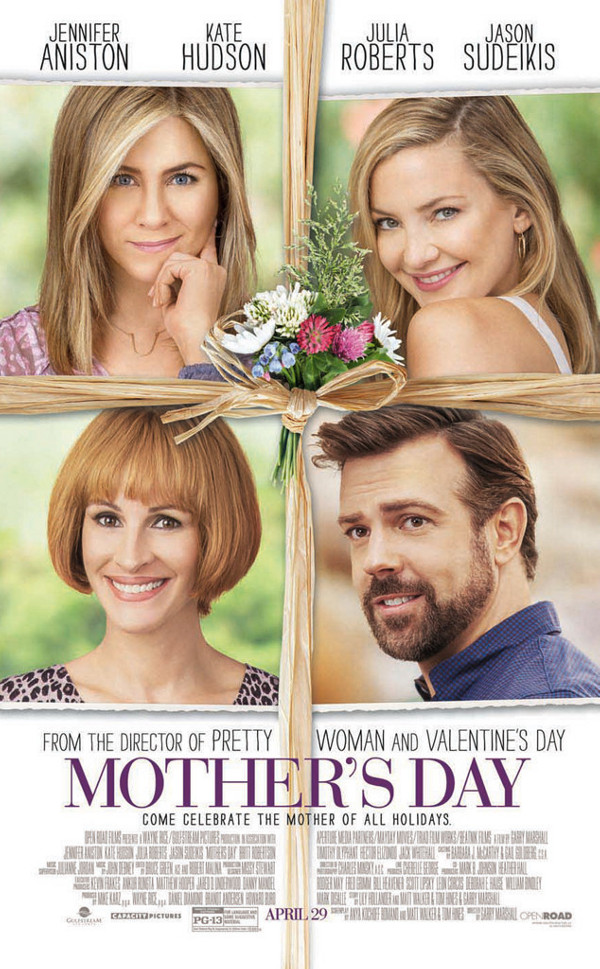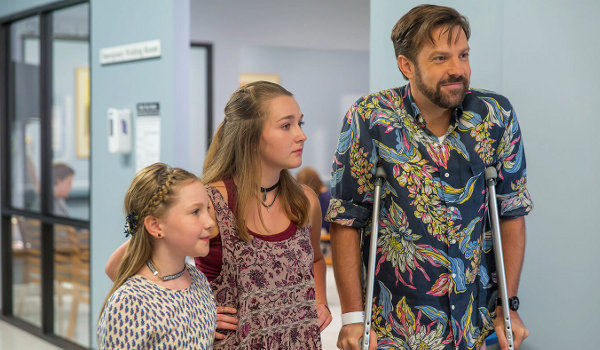- Title: Mother’s Day
- wiki: link

 Following the pattern of his last two films (Valentine’s Day and New Year’s Eve) director Garry Marshall‘s Mother’s Day is a cookie-cutter ensemble dramaedy set around a particular holiday. Filled with paper-thin characters who all can be described by a single characteristic who are marginally connected through themes of mothers and their daughters, Mother’s Day is a lazy film filled with sitcom humor and blase drama that asks the bare minimum of its cast. If it were a meal, Mother’s Day would be a lukewarm McDonald’s extra-value meal that no one bothered to put under the heat lamp. If it were a color it would be beige.
Following the pattern of his last two films (Valentine’s Day and New Year’s Eve) director Garry Marshall‘s Mother’s Day is a cookie-cutter ensemble dramaedy set around a particular holiday. Filled with paper-thin characters who all can be described by a single characteristic who are marginally connected through themes of mothers and their daughters, Mother’s Day is a lazy film filled with sitcom humor and blase drama that asks the bare minimum of its cast. If it were a meal, Mother’s Day would be a lukewarm McDonald’s extra-value meal that no one bothered to put under the heat lamp. If it were a color it would be beige.
The stories include divorced mother (Jennifer Aniston) of two sons (Caleb Brown and Brandon Spink) struggling with the news that her ex-husband (Timothy Olyphant) has married a much younger woman (Shay Mitchell), grown sisters (Kate Hudson and Sarah Chalke) hiding their romantic relationships from their conventional parents (Margo Martindale and Robert Pine), a widower (Jason Sudeikis) and his two daughters (Ella Anderson and Jessi Case) struggling to move on a year after his wife’s death, a career-minded Home Shopping Network star (Julia Roberts) with what passes for a dark secret in this movie, and a waitress (Britt Robertson) unable to commit to her boyfriend (Jack Whitehall).
Although countless other films have attempted to recreate the success of Love Actually, nearly all have failed proving that a movie of this type that genuinely entertains is an exception to, well, movies just like this one. Far smarter than Marshall’s film, Richard Curtis crafted an ensemble piece which was able to both celebrate and poke fun at the genre at the same time (no small feat). This script, which somehow took four screenwriters to pen, lacks any kind of depth whatsoever. Over the course of two-hours various storylines of this toothless Lifetime movie for women will crisscross but at no point are we sold on the bland characters’ troubles which we have no doubt will all be solved before the closing credits.
The cast is fine but none of them are asked to even break a sweat in one-dimensional roles they could all sleepwalk through. Each charater is given only a single descriptive feature, almost all of which can be described in a single word. For example Jennifer Aniston’s Sandy is frustrated, but that’s all she is. Shay Mitchell as her husband’s new wife Tina is young, but again there’s no actual depth given to the character. Sandy is neither reasonable nor unreasonable in her frustration. Her reactions, many of them over-the-top, simply exist because the script needs to fill its two-hour running time. Is Tina good for Sandy’s ex or their children? The script doesn’t care, so why should we? We don’t spend enough time with any character to really get to know them, and even if we did the script suggests there’s nothing behind the shadily-built facade.
You could likely have much the same experience of seeing this movie by staying home and watching two hours of a sitcom you only occasionally enjoy. It offers a few laughs here an there, most of them cheap jokes at a character’s expense (with a handful of genuinely funny moments scattered over 118 minutes), and ensemble cast is full of actors whose work I usually enjoy, but the movie is less than the sum of its parts and makes no effort to harness the talent in front of the camera to do anything memorable (let alone exceptional).





I love Shay!